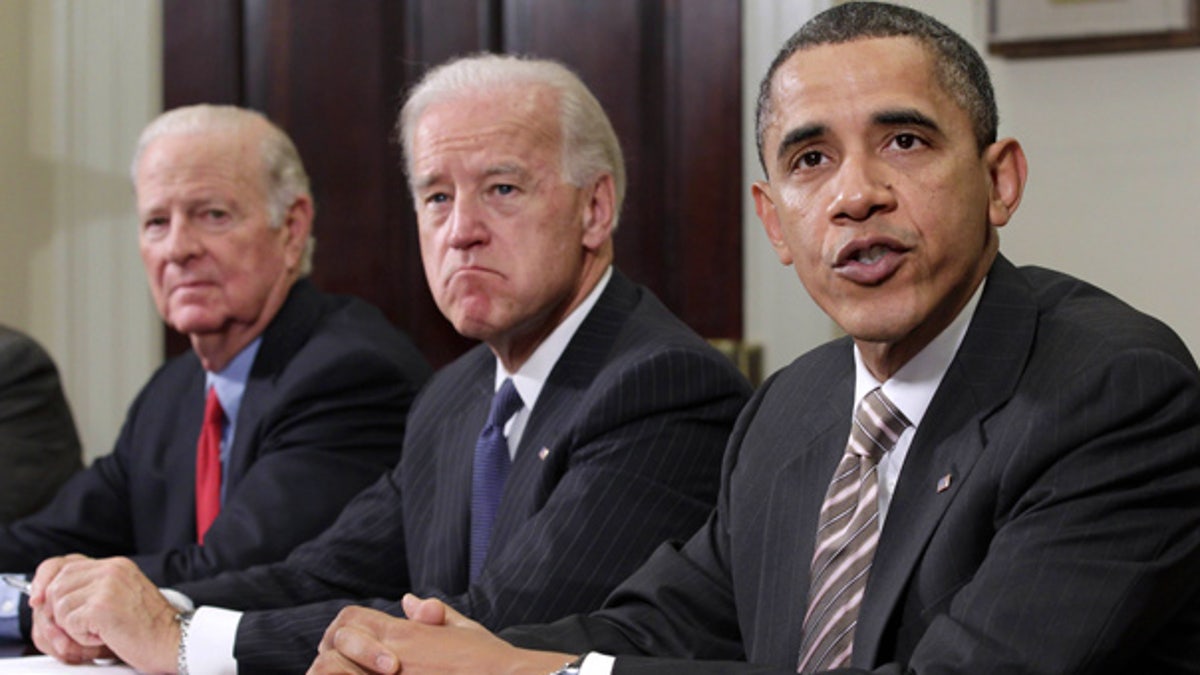
Nov. 18: President Obama, Vice President Biden and former Secretary of State James Baker III discuss the START pact at the White House. (AP)
The U.S. Senate was poised to approve a nuclear arms pact with Russia on Wednesday in what would be the latest in a string of legislative victories for President Obama after his party was soundly beaten in the midterm elections last month.
The Senate voted 67-28 to advance the legislation on Tuesday, easily exceeding the 60 votes required. Earlier, Republicans senators expressed outrage as Obama secured enough votes for ratification.
At least 10 Republicans publicly announced their support for the accord, including Tennessee Sen. Lamar Alexander, the No. 3 Republican in the Senate, putting it on a virtual glidepath to ratification by Wednesday night.
The Constitution requires two-thirds of those voting in the Senate to ratify the pact. Democrats needed at least nine Republican votes.
At a GOP news conference, Republicans who oppose the treaty warned of the consequences.
"Well this is a joke," said Sen. Jeff Sessions, R-Ala., adding that he believes the administration gave up too much to the Russians to negotiate the treaty.
"When you want zero nukes in the world, you're not an effective negotiator," he said.
Sen. Jim DeMint, R-S.C., said it's clear the administration is checking the box on many issues without any substance behind the box.
"We join millions of Americans who are outraged," he said, adding that it is being crammed under the cover of Christmas.
Senate Minority Leader Mitch McConnell, R-Ky., and Sen. Jon Kyl, R-Ariz., the No. 2 Republican in the Senate, also oppose the START agreement.
Treaty backers were heartened as several Republicans broke ranks, voting against three Republican amendments that would have effectively killed the treaty.
Alexander said he is "convinced that the plan's implementation will make giant steps toward modernization of those facilities so that we -- and our allies and adversaries -- can be assured that the weapons will work if needed."
"The president's statement that he will ask for these funds and the support of senior members of the Senate Appropriations Committee means that the plan is more likely to become a reality," he said on the Senate floor. "This will make sure the United States is not left with a collection of wet matches."
Sen. Johnny Isakson, R-Ga., said: "Only through setting the example, without giving in or capitulating a thing, do we give hope to the future that my grandchildren and yours can live in a world that will not be free of nukes but will be secure; that loose nukes are not in the hands of bad people; and we have transparency and accountability while still having the capability to secure ourselves both offensively and defensively to ensure the security of the people of the United States of America."
Senior Democrats were pushing for a decisive vote Tuesday to cut off debate and set the stage for the final vote. Republicans and Democrats were discussing amendments to the accompanying resolution, not the treaty, that would deal with Republican problems with missile defense and build support for the agreement.
The United States and Russia negotiated the New START pact to cap nuclear weapons and restart weapons inspections in the spirit of U.S. efforts to reset the relationship between the former Cold War foes.
Obama, who delayed his holiday vacation, lobbied senators by phone as he pressed to complete the treaty before January. Vice President Biden also called lawmakers.
Bolstering Obama's argument for quick action, Adm. Mike Mullen, chairman of the Joint Chiefs of Staff, sent a letter to lawmakers reiterating support for the accord.
"This treaty enhances our ability to do that which we in the military have been charged to do: protect and defend the citizens of the United States. I am confident in its success as I am in its safeguards. The sooner it is ratified, the better," Mullen wrote.
Senate Foreign Relations Committee Chairman John Kerry, a Democrat, read parts of Mullen's letter at a closed briefing.
Despite the letter, several conservative Republicans insist the treaty would restrict U.S. options on a missile defense system to protect America and its allies and argue that the accord has insufficient procedures to verify Russia's adherence.
Politics coursed through the debate Monday as Republicans were still peeved by Senate Majority Leader Harry Reid's decision to interrupt the six days of treaty consideration for votes on repealing the ban of gays serving openly in the military and an unsuccessful immigration measure, legislation they considered sops to the Democratic Party's liberal base.
"No senator should be forced to make decisions like this so we can tick off another item on someone's political checklist before the end of the year," McConnell said.
Obama suffered a self-described "shellacking" in the Nov. 2 midterm elections as his party lost control of the House and suffered an erosion in its Senate majority. Yet he has scored two major political wins in Congress' postelection session -- overwhelming bipartisan passage of the tax deal he cut with Republicans and repeal of the ban on gays serving openly.
The treaty specifically would limit each country's strategic nuclear warheads to 1,550, down from the current ceiling of 2,200. It also would establish a system for monitoring and verification. U.S. weapons inspections ended a year ago with the expiration of a 1991 treaty.
The Associated Press contributed to this report.




